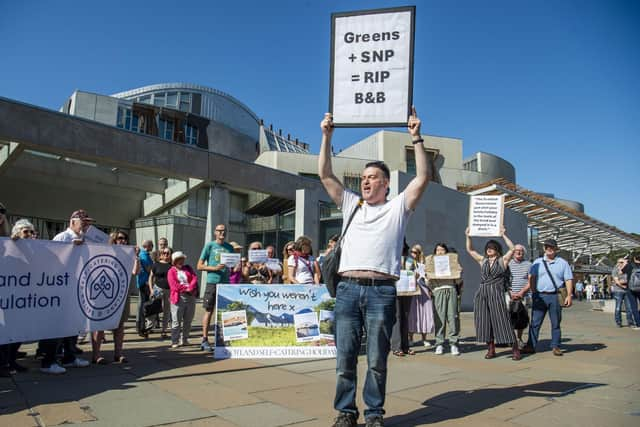Scottish Government's clampdown on short-term lets won’t solve the housing crisis – Murdo Fraser
Today at Holyrood the Scottish Conservatives will use our precious opposition time to call for a delay of a year in the implementation of the Scottish Government’s disastrous licensing scheme for short-term lets. It is a move which is certainly much needed. There are huge concerns across the tourist sector, and the wider economy, about the over-reach in this scheme, and the potential damage that will be done to a vital sector of the economy.
Think the named person scheme. Think gender recognition. This measure is in the same territory of authoritarian clumsiness.
Advertisement
Hide AdAdvertisement
Hide AdResearch by the Association of Scottish Self Caterers (ASSC), who have proved themselves a highly effective lobbying organisation on the issue, reveals that as many as two-thirds of those currently operating in the sector could close due to the bureaucracy and fees involved in applying for a licence. Even if the final figures are nowhere near as high as that, it is inevitable that we will see some reduction in capacity in the short-term let sector.
It is not just tourists who are affected by this. Short-term lets are used not only by visitors, but many other sectors of society. Commercial travellers. Those seeking somewhere to stay on a temporary basis whilst between houses. Perhaps people having renovation works done to their own home. People whose work takes them to different parts of the country.
Not everyone wants to stay in a hotel, and the privacy, affordability and convenience of a short-term let is much sought after. The concerns about the operation of “party flats” in city centre locations are well understood and can be tackled through the existing planning system. But the proposed new regime will apply not just to stand-alone self-catering units, but to the renting of rooms in individuals’ homes. To traditional B&Bs and guest houses and even to house swaps.
There is no evidence whatsoever of any of these latter categories generating complaints about anti-social behaviour, but they are all caught in crosshairs of the blunderbuss new rules. There is no need for a “one size fits all” approach to the legislation.
It would have been perfectly possible for the Scottish Government to devolve to local councils the right to draw up rules for their own areas. Those with a history of complaints around the operation of self-catering lets would then have had the opportunity to take a different approach from those in other, perhaps more rural, areas, where self-catering lets have been operating as part of the tourist sector for decades and more without any problems appearing.


Those who support the legislation argue that a proliferation of short-term lets drives up housing costs, reduces affordability and contributes to a cost-of-housing crisis. This may be particularly the case in areas such as Edinburgh city centre and Skye, where the Scottish Government estimates that more than ten per cent of dwellings are used for secondary letting.
But an analysis done by the Fraser of Allander Institute of the Business and Regulatory Impact Assessment (BRIA) for the legislation reveals that the Scottish Government has made no attempt to quantify the number of properties which might be released from secondary letting and then made available as permanent homes. Indeed, section e of the BRIA is, in the words of Fraser of Allander, “notable for the absence of any quantification of impacts”.
If those renting a room in their home have to cease doing that it is hardly likely that there will be an increase in available accommodation. Anecdotal evidence supports the view that there will be no boom in affordable properties as a consequence of the legislation.
Advertisement
Hide AdAdvertisement
Hide AdAccording to Mark Tate, chief executive of the Cairngorms Chamber of Commerce, 16 properties in his area have so far withdrawn from the market as a result of the new rules. Twelve of those have become second homes, so have gone from being economically active for 35-40 weeks of the year and putting money into the economy to being occupied for about two or three weeks. It is the worst possible outcome.
There is a pattern familiar in many rural areas such as the Highlands and Islands, where individuals own second homes, often inherited, to which there is a strong family and nostalgic attachment. These homes are used for a few weeks in the year by family members, but otherwise are rented out on a short-term basis to visitors.
If the consequence of the legislation is that many such homes cease to operate as self-catering lets, then the chances are that they will remain as family homes and simply lie empty for much of the year, with a loss of the spending power of visitors.
As Mark Tate also observes, many of the properties which are available for short-term let are large multi-bedroom lodges which by no stretch of the imagination would ever be considered affordable property for local families. The prospect of the legislation helping address the housing crisis in many parts of Scotland must be extremely remote.
The ASSC is keen to stress, as are others in the tourist sector, that they are not opposed to regulation. Other countries and jurisdictions, including Wales, have already introduced or are looking to introduce low-cost schemes which will not have the unintended consequences we see here in Scotland.
Today gives the opportunity for the Scottish Government to think again about plans which will not only do serious damage to the tourist industry in Scotland, but fail to deliver on the objective of making more affordable housing available. If it really is serious about listening to the voices of business, as it claims that it is, it really must think again.
Murdo Fraser is a Scottish Conservative MSP for Mid-Scotland and Fife
Comments
Want to join the conversation? Please or to comment on this article.
